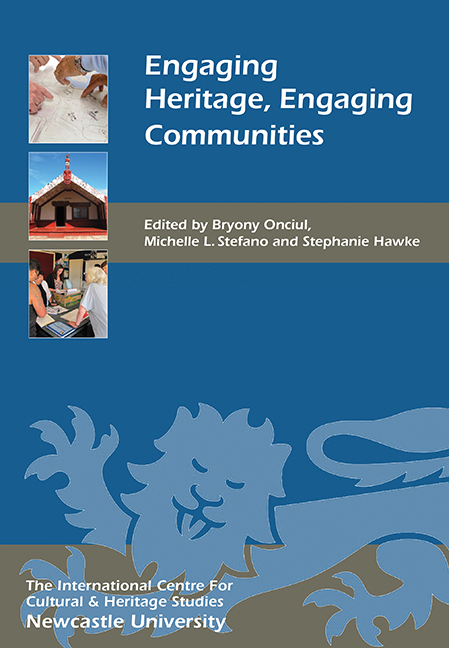Book contents
- Frontmatter
- Contents
- List of Illustrations
- Acknowledgments
- Introduction
- Engaging Concepts
- Engaging Creatively
- Engaging Challenges
- 12 Embattled Legacies: Challenges in Community Engagement at Historic Battlefields in the UK
- 13 At the Community Level: Intangible Cultural Heritage as Naturally-occurring Ecomuseums
- 14 Subaltern Sport Heritage
- 15 Museums and the Symbolic Capital of Social Media Space
- 16 Relational Systems and Ancient Futures: Co-creating a Digital Contact Network in Theory and Practice
- 17 Interview – Conal McCarthy
- List of Contributors
- Index
- Miscellaneous Endmatter
14 - Subaltern Sport Heritage
from Engaging Challenges
Published online by Cambridge University Press: 13 April 2017
- Frontmatter
- Contents
- List of Illustrations
- Acknowledgments
- Introduction
- Engaging Concepts
- Engaging Creatively
- Engaging Challenges
- 12 Embattled Legacies: Challenges in Community Engagement at Historic Battlefields in the UK
- 13 At the Community Level: Intangible Cultural Heritage as Naturally-occurring Ecomuseums
- 14 Subaltern Sport Heritage
- 15 Museums and the Symbolic Capital of Social Media Space
- 16 Relational Systems and Ancient Futures: Co-creating a Digital Contact Network in Theory and Practice
- 17 Interview – Conal McCarthy
- List of Contributors
- Index
- Miscellaneous Endmatter
Summary
Conceptualisations of heritage have become complex in recent years. Though traditionally understood within conservationist paradigms and, therefore, primarily concerned with the preservation of objects, buildings and other tangible articles, heritage is now understood as more of a process whereby heritage is not the object itself but the wide range of values and interpretations that are ascribed to objects, rituals and traditions, to name but a few (Ashworth 2008; Smith 2006; Tunbridge et al 2013). The consequence of a process-based approach to heritage is that we may examine the uses of heritage and, in particular, how heritage can be tool in the legitimisation and de-legitimisation of competing claims to the past. As Silva and Santos (2012, 438) argue, ‘power is a central matter within the realm of heritage’ and, following Graham et al's (2000) assertion that the only inherent aspect of heritage is dissonance, it stands to reason that heritage is not just a top-down hegemonic process but also a tool of political legitimisation and advocacy for social movements, particularly by those groups seeking to alter consensus, statesanctioned and regulated versions of the past in order to enact social and cultural change (Smith 2006). In this, subaltern heritage narratives – which stand outside of dominant discourses, challenge consensus views and, in some cases, undermine those views through dissonant and alternate heritage perspectives – become a means by which communities participate in creating and shaping their heritage and identity, particularly when these community heritages have been ignored, marginalised or silenced (Smith 2006; 2007).
In terms of the wide variety of heritages on offer, sport heritage perhaps seems the least likely to form subaltern heritage approaches. After all, sport heritage – whether in tangible forms such as museums, stadia and ceremonies or in intangible forms such as chants, rituals and traditions (Ramshaw and Gammon 2005) – typically advocates hero-worship (Snyder 1991) or dominant political agendas such as honouring military personnel and veterans (Scherer and Koch 2010), whereby dissonant social or political considerations are marginalised or entirely absent (Springwood 1996). Furthermore, as sport heritage is often created primarily for its economic value either through tourism or through souvenir sales (Ramshaw and Gammon 2005), subaltern approaches in sport heritage – particularly those approaches that challenge or embarrass teams, leagues, owners, other groups of supporters or sanctioned heritage institutions such as halls of fame – may not always be saleable.
- Type
- Chapter
- Information
- Engaging Heritage, Engaging Communities , pp. 179 - 188Publisher: Boydell & BrewerPrint publication year: 2017



